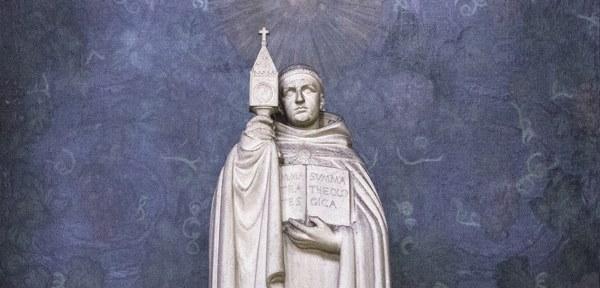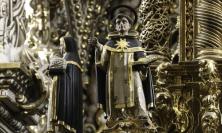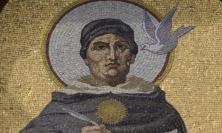On 28 January, we celebrate the Feast of St Thomas Aquinas, the great theologian and Doctor of the Church. The Thomist account of religion and prayer can provide a basis for unity in a society that is in so many ways divided, says Joe Egerton. He applies the thinking of St Thomas to a question that is acutely relevant in contemporary society: the right of the State to legislate on matters of religion.
There are many views on the position of religion in the contemporary state. Some regard religious belief as evil and to be discouraged; some say religion is an entirely private matter, to be practised by consenting adults in private; some see it as a potential glue for our society; and some would allow the imposition of religious law.
These positions seem incompatible. Surely any compromise would require somebody to give up a belief, wouldn’t it? If the answer to that question is ‘Yes’, then we are indeed in severe difficulties. But suppose it is ‘No’. Suppose we could discuss the place of religion in our society without having to affirm or deny any particular belief – then we would have a basis for constructive dialogue.
St Thomas Aquinas offers us such a way forward. In his Summa Theologiae, we find an account of religion which does not rest on any act of faith.[1] Religion, according to St Thomas is a natural virtue, an excellence of character, sometimes called ‘a moral virtue’ – indeed, for St Thomas, religion is the greatest of such virtues.[2]
What does St Thomas mean by a virtue? Virtues (or ‘excellences – the Greek word aretē can be translated both as ‘virtue’ and as ‘excellence’) are dispositions that drive our actions. He divides them into three categories. Two of these are drawn from Aristotle[3], namely the virtues of character and the virtues of the intellect. These virtues are acquired by habituation: we first learn them from our parents or teachers; perhaps later from books or films. As we acquire them we acquire an ability to make good choices. [4] We thus learn to be just, truthful, courageous, temperate, and so on. We have a capacity by reflecting on our actions to become more virtuous or even acquire a virtue we have previously lacked.[5]
The definition St Thomas gives for the virtue of religion comes not from Holy Scripture but from a Roman philosopher-statesman, Marcus Tullius Cicero (‘Tully’ to Aquinas), born in 106BC and proscribed and killed in 43BC: ‘Tully says (Rhet. ii, 53) that “religion consists in offering service and ceremonial rites to a superior nature that men call divine.”’ Religion – which for St Thomas embraces prayer – is a practice to which we become habituated, which we learn first from others, and is thus a virtue of character.
Faith is something different, says St Thomas. While religion is the offering of praise and prayer to God, faith is a reaching out to God, whereby we do not just believe that ‘there is a God, but we believe God.’[6] Faith, for Aquinas, is one of three great virtues that do not fit comfortably into Aristotle’s two categories. The other two are hope and charity. These, St Thomas argued, are ‘infused’ by the working of the Holy Spirit. They are gifts of God – the theological virtues.
St Thomas’s location of religion as a natural virtue enables us to engage in a debate as to what is and what is not permissible in a religious activity without being accused of interfering in a matter of faith. There is a close linkage in the thinking of St Thomas between the natural virtues and the natural law. The first precept of the natural law is to do good and avoid evil; and religion, as a virtue, is directed towards our final end: it is thus necessarily going to incline us to do good and avoid evil. The state, then, can say that any action that directs away from the good – such as terrorism, or any recruitment to or incitement of it – is an abuse of religion; and legislation to prevent such dangerous corruptions would be justified.[7] Note, however, that this argument does not give the state licence to interfere in the content or formulation of religious belief.
Aside from matters of law and state, adopting the Thomist stance that religion is offering praise and prayer to God and thus is independent of specific theological beliefs, offers us a valuable lesson: theological arguments can divide; prayer can only unite. Differences in the content of beliefs have no place in the Thomist account of what happens when Muslims go to their mosques, Jews to their synagogues, Christians to their churches, Hindus and Sikhs to their temples. If we were fully to acquire the virtue of religion as St Thomas describes, we would immediately recognise the value of what happens in every mosque and every synagogue and in every temple – and our response would be joy. This is not to deny differences of belief, but it is to recognise a basis for us all to live side-by-side, in honest recognition of our differences. As the Archbishop of Canterbury wrote on reconciliation inside the Church of England: ‘Reconciliation doesn’t mean we all agree. It means we find ways of disagreeing – perhaps very passionately – but loving each other deeply at the same time, and being deeply committed to each other’. [8]
Joe Egerton first encountered St Thomas forty years ago when a Jesuit at Stonyhurst recommended GK Chesterton's The Dumb Ox to him.
The original inspiration for this article was a homily by The Revd Canon Nicholas Papadopulos, Canon Treasurer of Canterbury Cathedral, given at Compline on the Third Sunday in Advent.
[1] Summa Theologiae IIa IIae Q81 (or religion) and Q83 (on prayer) I have put links in to an English translation; the original Latin is crisper and far more elegant. Q81 is here and Q83 is here in the great Corpus Thomisticum – a magnificent joint effort of Jesuits, Dominicans and laity.
[3] See Aristotle, Nicomachean Ethics (EN) and Eudemian Ethics (EE); St Thomas Aquinas’s Commentary on the EN is still justly praised. An excellent short modern introduction is David Bostock’s Aristotle’s Ethics
[4] Alasdair MacIntyre’s book Dependent Rational Animals: Why Humans need the Virtues provides an accessible modern account of St Thomas’s thinking on the virtues. As Alasdair MacIntyre says in the introduction, he corrects errors on Aquinas that he made in his well-known book, After Virtue.
[5] In de Veritate St Thomas develops Aristotle (EN 1) describing humans as having a capacity to reflect on their actions and to do this voluntarily. Without this capacity the Ignatian exercises would be an impossibility. This is one of the important illustrations of how the Spiritual Exercises are grounded in the antecedent Catholic tradition.
[7] St Thomas expressly warns that human law should not seek to suppress all vices but only those “from which it is possible for the majority to abstain; and chiefly those that are to the hurt of others, without the prohibition of which human society could not be maintained: thus human law prohibits murder, theft and such like” ST Ia IIae Q96 Art 2.
[8] See the Archbishop’s Priorities for his ministry: reconciliation is second, the revival of prayer the first.






